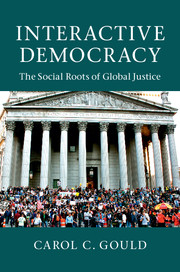Book contents
- Frontmatter
- Dedication
- Contents
- Acknowledgements
- Introduction
- Part I A theoretical framework
- Part II The social roots of global justice
- 5 Transnational solidarities
- 6 Does global justice presuppose global solidarity?
- 7 Recognition and care in global justice
- 8 Gender equality, culture, and the interpretation of human rights
- 9 The sociality of free speech: the case of humor across cultures
- 10 Violence, power-with, and the human right to democracy
- Part III Interactive democracy – transnational, regional, global
- Works cited
- Index
- References
9 - The sociality of free speech: the case of humor across cultures
Published online by Cambridge University Press: 05 September 2014
- Frontmatter
- Dedication
- Contents
- Acknowledgements
- Introduction
- Part I A theoretical framework
- Part II The social roots of global justice
- 5 Transnational solidarities
- 6 Does global justice presuppose global solidarity?
- 7 Recognition and care in global justice
- 8 Gender equality, culture, and the interpretation of human rights
- 9 The sociality of free speech: the case of humor across cultures
- 10 Violence, power-with, and the human right to democracy
- Part III Interactive democracy – transnational, regional, global
- Works cited
- Index
- References
Summary
Introduction
Free expression has most often been considered as a right or capacity of individuals. Although free expression has been theorized for its political import, the social dimensions of such speech or expression have received less scrutiny. An exception perhaps has been the philosophical reflection on dialogue, though even that has often been viewed through the lens of democratic deliberation. Of course, all speech as communication is social by nature. This chapter attempts to delineate some of the less obvious social dimensions of freedom of expression, both as a phenomenon and, to a degree, as a right. The analysis focuses especially on the exemplary use of speech in the telling of jokes. The connection of jokes to a particular audience that understands them and to which they are directed will be seen to raise interesting questions both of inclusion and exclusion that are especially relevant to the possibilities for cross-cultural speech. Although jokes, and humor more generally, are in some ways idiosyncratic, I think that they may nonetheless help to reveal some of the limitations and possibilities of understanding speech and communication in increasingly dominant transnational contexts.
Taking off from Ted Cohen’s helpful work Jokes: Philosophical Thoughts on Joking Matters, this chapter first considers what jokes presuppose about the individuals or community that hears them, and some of the problems that can arise when they are taken as derogatory towards another culture. It then looks at some of the ways that jokes can facilitate social and political protest. The chapter goes on to briefly consider other forms of social speech, and especially deliberation, along with its role in the functioning of voluntary associations and social movements. These various analyses provide a basis for some tentative conclusions about the sociality of free speech, about the conditions for avoiding exclusionary or oppressive speech, and concerning whether a global audience for humor and other forms of social expression is possible, or perhaps even desirable. Although the main focus is not on the basic philosophical justification of the right to free expression, these social aspects of speech suggest some additional factors for this justification.
- Type
- Chapter
- Information
- Interactive DemocracyThe Social Roots of Global Justice, pp. 164 - 178Publisher: Cambridge University PressPrint publication year: 2014



